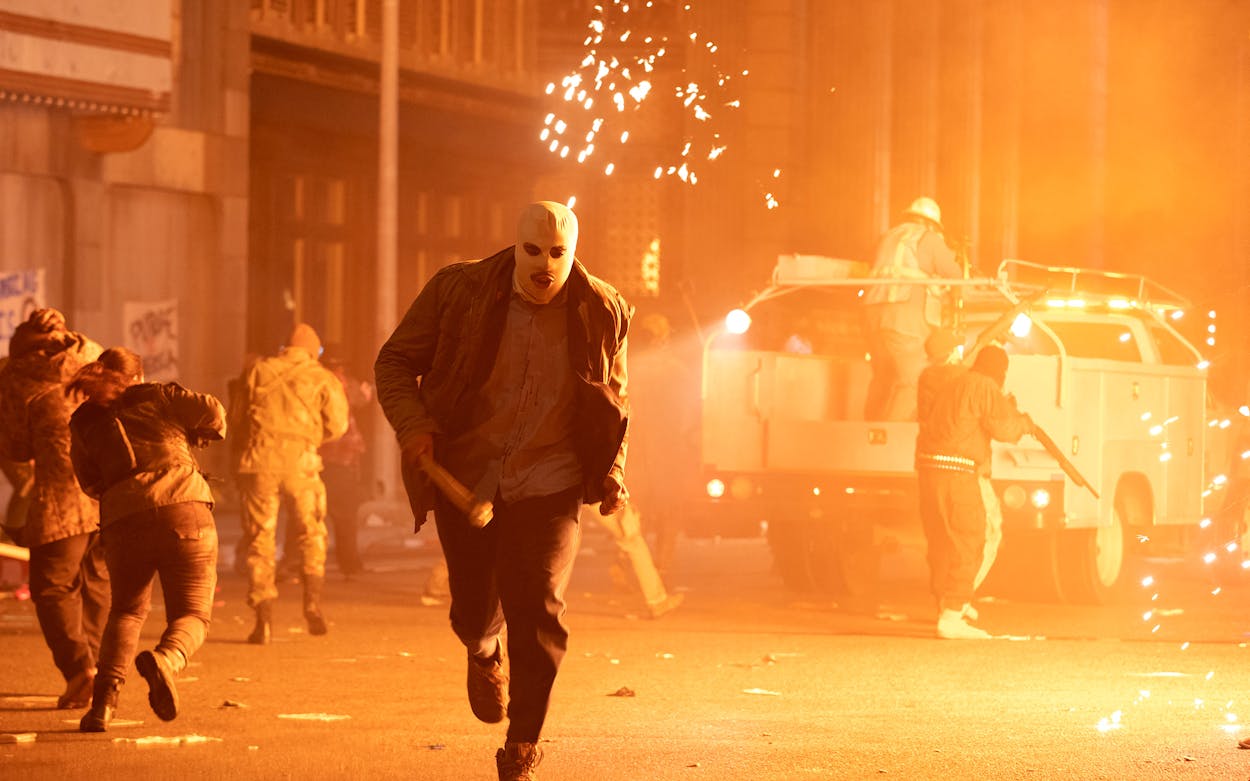It seems fitting that the first cinematic attempt at satirizing Trumpism in the post-Trump era should be a Purge movie. Over the course of four movies and a two-season TV series, The Purge has grown into a successful horror franchise by combining wanton violence with a caricature of America’s political anxieties. Moviegoers know what to expect: a dystopian America in which heroes protect themselves and their loved ones from murderous psychopaths who, one night a year, are legally permitted to wreak whatever bloody havoc they please.
But in The Forever Purge, in theaters this weekend, franchise creator James DeMonaco is aiming to flip expectations on their (severed) heads. It’s clearly an attempt to keep the franchise fresh, and in many ways DeMonaco succeeds, if a little inelegantly. But turning the tension of the last four years into a gory action thriller feels less cathartic and more like reliving a trauma.
The Purge has always been political, with its unsubtle nods to class warfare and inequality. But with each installment, DeMonaco has grown more overt with his references. The Purge: Election Year (2016) ends with reports of violent uprisings from Purge supporters questioning the results of the election when the newly elected president pledges to end the Purge. The First Purge (2018) makes pointed references to Trump and his rhetoric with the New Founding Fathers, who bill themselves as the party trying to “restore” America to its former glory.
In Forever, DeMonaco again kicks things up a notch. It’s four years after Election Year, and the New Founding Fathers have regained control of the government and reinstated the Purge. The country remains polarized, racial tensions are flaring, and immigration is the central political flashpoint. The film centers on Juan (Tenoch Huerta) and his wife Adela (Ana de la Reguera), Mexican immigrants who fled cartel violence and arrived in the fictional Texas ranch town of Los Feliz Valley. Juan works for white rancher Dylan Tucker (Josh Lucas) and his family while Adela learns English and adapts to life in Texas. The Tuckers treat Juan as nothing more than an employee, and sometimes a little less than that.
When Purge Night arrives, the Tuckers hunker down in their expansive ranch house while Adela and Juan pay for lodging and protection at an immigrant shelter. That night, right-wing extremists patrol the streets near the shelter in sanitation trucks and declare through megaphones, “We will no longer tolerate foreigners raping and pillaging the United States of America. America will be American once again. The purification of America has begun.”
Purge Night comes and goes, the sun rises, the all-clear sirens sound and Juan returns to the Tucker ranch. But before things return to normal, the extremists show up, threatening the lives of the Tuckers until Juan and a friend intervene. Bonded by newfound gratitude, the group rescues Adela from harm and flees the town. If the Tuckers and Juan and Adela want to escape the nonstop violence, the families will have to make it to Mexico, where they can seek sanctuary before the borders close.
Turning a white Texan family into refugees and Mexico into a desperately desired safe haven should be delicious fun. But tense action sequences are often undercut by sometimes unbelievably cartoonish dialogue from neo-Nazis and white supremacists. One of them calls the sound of machine-gun fire “homegrown music from the American heartland” with a completely straight face. Another tries to get Dylan to turn against Juan by telling him, “Let me explain: you kill the brownies and the two of you can live and stay here in this great God-loving country.” No one’s ever accused any Purge movie of being subtle.
Horror has often been a great genre for social commentary. Some of the best, most unsettling entries—from The Twilight Zone to Get Out—twist us into seeing clearly what we’d rather not. On that front, the Purge franchise is a mixed bag. Previous installments challenged their protagonists’ morality by forcing them to confront their class privilege or to recognize their own violent impulses. In The Forever Purge, it’s the Tuckers who are challenged to see things differently, while Adela and Juan’s story is mostly just one of survival.
Huerta and de la Reguera are a great action duo, and it’s easy to root for them as they inch closer to safety, but some of the situations they’re put in are hard to watch. Hearing crude anti-immigrant rhetoric from white supremacists as they hunt down immigrants doesn’t feel like particularly sharp commentary—and sometimes verges on immigrant-torture porn. And it all feels a bit too soon. We’ve only just come off the presidency of a man who launched his 2016 campaign by conflating Mexican immigrants with murderers and rapists. Forever was shot over a year before the insurrection of January 6, but watching the film’s coordinated militias, who turn against law enforcement and the military to pursue their nativist agenda, feels bleak and disturbingly familiar.
The Forever Purge delivers excellent on-brand action and over-the-top violence. It’s easy entertainment that benefited from overthrowing the traditional Purge rules. But attempting to satirize a fresh trauma leaves the franchise feeling more hopeless than insightful.
- More About:
- Film & TV
- Donald Trump








